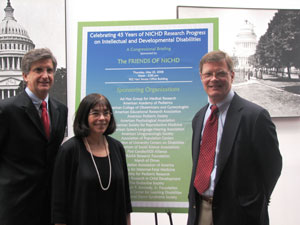Three IDDRC Directors and Family Member Present at Congressional Briefing Celebrating 45 Years of NICHD Research
May 23, 2008
The Association of University Centers on Disabilities (AUCD) joined with the Friends of the National Institute on Child Health and Human Development (FNICHD) to sponsor a Capitol Hill briefing today to celebrate 45 years of research accomplishments of the Eunice Kennedy Shriver Intellectual and Developmental Disabilities Research Centers (IDDRCs) and to hear about the latest scientific discoveries that will lead to better diagnosis, treatment, and mitigation of the impact of a range of intellectual and developmental disabilities. FNICHD is composed of over 100 national organizations that support the extraordinary work of the National Institute of Child Health and Human Development (NICHD), recently renamed the Eunice Kennedy Shriver National Institute of Child Health and Human Development. The American Psychological Association took the lead in organizing the briefing attended by over 90 Hill staff and disability organization representatives.
Congress established NICHD in 1963 to examine the broad aspects of human development in order to better understand intellectual and developmental disabilities and the events that occur during pregnancy. At the same time, Congress created the IDDRCs, which are located at premier universities across the country and serve as the world's largest concentration of scientific expertise in the fields of intellectual and developmental disabilities. The pioneering biomedical and behavioral research conducted at IDDRCs is improving the lives of countless individuals and their families who are impacted by a range of disorders, including autism, Down syndrome, Fragile X syndrome and Rett syndrome.
 |
| IDDRC Directors (from left) Pat Levitt, PhD, Vanderbilt Kennedy Center, TN; Marsha Mailick Seltzer, PhD, Waisman Center, WI; and Steve Warren, PhD, Kansas IDDRC; presented information to briefing attendees on the discoveries and accomplishments of IDDRCs. |
Speakers at the briefing included Duane Alexander, MD, Director of NICHD; Pat Levitt, Ph.D., Director, Vanderbilt Kennedy Center for Research on Human Development (IDDRC) at Vanderbilt University; Steve Warren, PhD, Vice Provost for Research and Graduate Studies at Kansas University (IDDRC); and Marsha Mailick Seltzer, PhD, Director, Waisman Center (IDDRC) and Vaughan Bascom Professor at the University of Wisconsin-Madison. These nationally known researchers highlighted some of the exciting developments currently underway in the study of not only the causes of a range of developmental disabilities but also how their research is leading to the prevention or amelioration of these disabilities and positively impacting the lives of millions of people with developmental disabilities and their families.
- View Dr. Levitt's presentation [1.84MB,
 ]
] - View Dr. Warren's presentation [0.98MB,
 ]
] - View Dr. Mailick Seltzer's presentation [1.07MB,
 ]
]
Participants of the briefing heard a dramatic and moving story from Jana Monaco, a mother of four children, two of whom have a metabolic disorder called isovaleric acidemia. The second child with the disorder was diagnosed early as a result of NICHD funded research, and a treatment regimen prevented the developmental impact that her first child experienced. Mrs. Monaco's story demonstrated the full impact of the translation of basic science into clinical practice and the interventions that can dramatically improve the lives of children and families.
All of the speakers highlighted the new knowledge that is being gained through the federal investment in NICHD. The presentations demonstrated the return on this investment from studies conducted across the country in understanding how the brain functions, the impact of ever earlier and more effective interventions, and the role of family care giving on the lifelong trajectories of individuals with intellectual and developmental disabilities. Speakers also highlighted the promise of ongoing research for the future and the potential benefits from getting a greater understanding of the risks to optimal development and from developing the treatments and preventative strategies for maximizing each child's potential.
About AUCD
The Association of University Centers on Disabilities (AUCD) is a membership organization that supports and promotes a national network of university-based interdisciplinary research and training programs. Network members consist of:
- 21 Intellectual and Developmental Disabilities Research Centers (IDDRC), funded by the Eunice Kennedy Shriver National Institute for Child Health and Development (NICHD)
- 34 Leadership Education in Neurodevelopmental Disabilities (LEND) Programs funded by the Maternal and Child Health Bureau (MCHB)
- 67 University Centers for Excellence in Developmental Disabilities (UCEDD), funded by the Administration on Developmental Disabilities (ADD)
These programs serve and are located in every U.S. state and territory and are all part of universities or medical centers. A full directory and more information are provided online at www.aucd.org.







